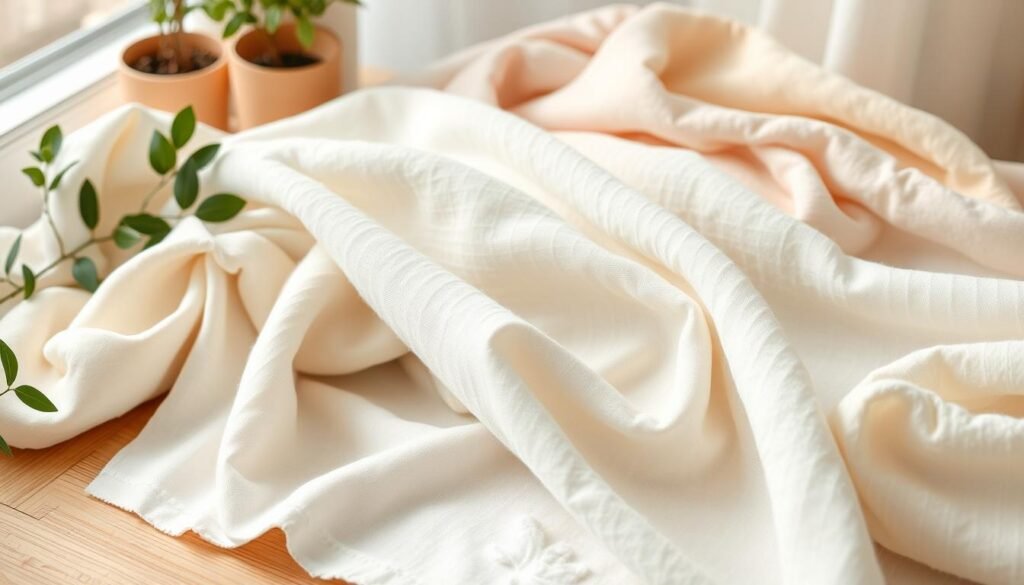About 31.6% of adults in the United States have eczema at some time in their lives. This fact highlights the need to know common eczema triggers and how to manage them. Knowing these triggers can help prevent flare-ups. This makes life better for those with eczema.
Starting to manage eczema means learning what causes flare-ups. This knowledge is crucial for those dealing with this skin issue. This article offers insights into eczema triggers and tips to avoid them. The goal is to help people achieve healthier skin.
Key Takeaways
- Understanding eczema triggers is crucial for effective management.
- About 31.6% of adults in the U.S. are affected by eczema at some point.
- Identifying personal triggers can help in preventing flare-ups.
- Practical tips can aid in managing symptoms and improving daily life.
- Regular awareness and observation are key in managing eczema effectively.
Understanding Eczema and Its Impact
Eczema is a common skin condition that many people find confusing. They often wonder, “What is Eczema?” It’s a chronic issue that makes the skin dry, itchy, and inflamed. Millions suffer from it, and it really affects their lives. Things like genetics, how our immune system works, and our environment can cause eczema. Understanding eczema means knowing the challenges of managing itchy flare-ups and discomfort.
What is Eczema?
Eczema is actually different skin problems that pose various challenges. It usually makes the skin red and itchy. People need ongoing treatment. Knowing what eczema is helps them find the right care and manage symptoms better.
The Different Types of Eczema
Eczema comes in several types, such as:
- Atopic Dermatitis: This kind often runs in families and causes frequent flare-ups.
- Contact Dermatitis: It happens when the skin touches irritants or allergens.
- Dyshidrotic Eczema: This type creates small blisters, usually on hands and feet.
Every eczema type has its own triggers and symptoms, showing why personal management plans are key.
How Eczema Affects Daily Life
Eczema’s impact on everyday life is huge. It can make itching and skin pain disrupt your day, work, and meeting people. Dealing with eczema often means changing your skin conditions with new lifestyle habits and skincare routines. The goal is to lessen flare-ups and feel better.
Common Eczema Triggers
Knowing what causes eczema flare-ups is key to control symptoms. Learning about Key Eczema Triggers helps people avoid outbreaks. Environmental factors, skin irritants, and stress are big triggers. Dust mites and pet dander can make symptoms worse. So can harsh soaps and perfumes. Stress is another major cause of eczema problems.
Identifying Key Eczema Triggers
Figuring out what causes your eczema is crucial. People often report these triggers:
- Environmental allergens like pollen and mold
- Irritating materials and soaps
- Food allergies, such as to dairy or nuts
- Extreme weather changes
Tracking your reactions helps identify what bothers your skin. For more help, visit this link. It offers detailed guidance.
The Role of Individual Sensitivities
Everyone’s eczema is different because of personal sensitivities. What affects one person might not bother another. This means managing eczema is very personal. Keeping track of your unique triggers is vital. It helps create a plan to reduce flare-ups tailored to you.
Skin Irritants and Their Effects
It’s really important to know about common skin irritants to manage eczema better. Things like certain chemicals can cause reactions. This leads to flare-ups and feeling uncomfortable. Learning what to avoid helps lower eczema’s impact.
Common Skin Irritants to Avoid
Some items like harsh soaps and particular fabrics can really irritate the skin. Also, things like alcohol and fragrances in beauty products can make things worse. It’s key to choose products that are gentle and made for sensitive skin to avoid eczema flare-ups. Here are some irritants to stay away from:
- Harsh soaps
- Strong detergents
- Fabrics that itch, like wool
- Beauty items with alcohol or fragrance
- Cleaning products with harsh chemicals
How to Identify Personal Skin Irritants
Finding out what irritates your skin can start with a diary of products used and how your skin reacts. Trying new products on a small area first can stop irritation. A dermatologist might suggest patch testing to find out what bothers you. These steps can create a skincare routine that fights your specific issues. This is a solid path for those wanting to identify skin irritants that set off their eczema.
| Skin Irritant | Impact on Eczema |
|---|---|
| Harsh soaps | Can strip skin of natural oils, leading to dryness |
| Strong detergents | May leave residues that irritate sensitive skin |
| Wool and rough fabrics | Can cause itching and inflammation |
| Products with alcohol | Can lead to dryness and irritation |
| Fragranced products | Often triggers allergic reactions |
Environmental Factors Influencing Eczema
Getting to know how the environment affects eczema is key to control it better. The weather and pollution level play a big role in how bad the eczema gets. By understanding these elements, people can change their living habits and skin care to suit their needs.
Impact of Weather Conditions
The link between weather and eczema is complicated. Shifts in temperature, moisture, and air cleanliness can set off eczema. For example, cold, dry air might dry out the skin, causing more irritation. On the other hand, too much humidity can make you sweat more. This can bother the skin and lead to more eczema problems.
Knowing about these changes helps folks adjust how they take care of their skin. They might use richer moisturizers in the cold seasons. During hot, sticky summers, lighter and calming skin products could be better.
Exposure to Pollution and Its Effects
Pollution’s effect on skin health is something we can’t ignore. Things like car smoke and factory chemicals can damage the skin’s protective layer. This can cause eczema to act up. These particles might irritate or cause allergies in people who are sensitive.
Being aware of the air quality around you can guide your outdoor plans. Staying indoors when pollution is high might help keep your skin calm.

Food Allergens and Dietary Considerations
Many find that their eczema worsens with certain foods. It’s key to know how food affects your skin. Figuring out which eczema triggers in diet you have can shape a better meal plan. This plan can enhance skin health.
Common Food Allergens Linked to Eczema
Some foods are known to make eczema symptoms worse. Common culprits include:
- Dairy products
- Eggs
- Nuts
- Soy
These foods can cause more flare-ups for some. Knowing what affects you personally is key in managing Food Allergens and Eczema. Working with a health expert on an elimination diet can be very helpful.
How to Keep a Food Diary
Keeping a food diary for eczema can help spot what triggers your symptoms. By noting what you eat and any skin changes, you can see patterns. Follow these steps:
- Write down everything you eat and its ingredients.
- Track any reactions in your skin.
- Look over your diary every week to find triggers.
This method helps keep your skin healthier by avoiding problem foods. A diary is a great way to understand how food impacts you. You can make smarter food choices with its help. Find more tips in this guide.
Stress Management Techniques
It’s key to understand how stress impacts eczema for effective care. Stress can spark eczema flare-ups, with many people seeing a clear link between stress and their skin. High stress can weaken the immune system, affecting skin health and making problems worse.
The Connection Between Stress and Eczema
Studies show stress greatly affects skin, especially eczema. When stressed, our bodies release hormones that may cause skin irritation and inflammation. This response increases itchiness and discomfort, making eczema worse.
Effective Stress Reduction Strategies
To improve emotional and skin health, try these stress reduction tips:
- Regular exercise: Physical activity helps release endorphins, lowering stress.
- Mindfulness meditation: Mindfulness encourages relaxation and helps manage anxiety.
- Engaging in hobbies: Enjoyable activities offer a healthy distraction from stress.
- Deep breathing exercises: Simple breathing methods can soothe the mind and ease tension.
- Yoga: Yoga combines movement and mindfulness, reducing stress significantly.
Using these methods can build emotional resilience. This might reduce stress-related eczema flare-ups.

Humidity Levels and Skin Health
Humidity plays a critical role in keeping our skin healthy, especially for those with eczema. The relationship between humidity and eczema is complex. High humidity can make you sweat more. This can irritate your skin and make eczema worse. On the flip side, low humidity can dry out your skin. This makes it easier for skin to get irritated and inflamed. For people with eczema, knowing how humidity affects their skin is key.
The Influence of Humidity on Eczema
Humidity can really affect your skin’s hydration and health. In low humidity, your skin might lose moisture. This can make your skin look dry and cracked. It can also make eczema symptoms worse. But when there’s a lot of humidity, your skin might get too moist. This can lead to bacterial growth on your skin. It can make eczema worse or cause infections. Keeping humidity at the right level is important for your skin’s health.
Tips for Managing Humidity Indoors
Keeping your indoor environment comfortable is key to controlling eczema. Here are some ways to manage indoor humidity:
- Use a humidifier in the winter to prevent the air from getting too dry.
- A dehumidifier can help reduce moisture in the summer.
- Use a hygrometer to keep an eye on the humidity level indoors.
- Open windows now and then to improve air flow.
- Use exhaust fans in wet areas like bathrooms and kitchens.
Managing humidity indoors can really make a difference for people with eczema. By adjusting your skincare to fit the humidity, you can feel more comfortable. This can lead to fewer flare-ups and a better quality of life.
| Humidity Level | Effect on Skin | Recommended Action |
|---|---|---|
| Low | Dry skin, increased irritation | Use a humidifier |
| Optimal (30-50%) | Well-hydrated skin | Maintain humidity |
| High | Sweating, possible irritation | Use a dehumidifier |
Fabric Sensitivity and Clothing Choices
Choosing the right fabrics is key to managing eczema. Those with sensitive skin need to pick materials that reduce irritation. Cotton, bamboo, and silk are great because they’re gentle on the skin. On the other hand, synthetic materials might make eczema worse. Wearing loose and breathable clothes can also make a big difference in comfort.
Best Fabrics for Sensitive Skin
Cotton is a top fabric for those with eczema. It’s breathable and soft, perfect for wearing all day. Other good choices include:
- Bamboo
- Silk
- Lyocell
These fabrics keep the skin cool and reduce moisture, which can cause eczema flare-ups. When choosing eczema-friendly clothing, avoid materials like wool and synthetics that might irritate the skin.
Clothing Care Tips for Eczema-Friendly Fabrics
It’s important to care for eczema-friendly clothing the right way. Use fragrance-free detergents, as perfumes can make skin reactions worse. Here are some tips to keep fabrics in good shape:
- Rinse clothes well to get rid of all detergent.
- Skip fabric softeners, as they can leave irritating residues.
- Wash sensitive clothes in a separate cycle.
These steps help maintain the clothes’ texture, preventing skin irritation. For more information on the best fabrics for eczema, exploring different materials can improve skin comfort and health.

Household Chemicals to Avoid
Many everyday products can be risky for those with eczema. Common chemicals in cleaners and personal care items might cause eczema flare-ups. It’s crucial to spot potential Eczema Triggers at Home.
Common Household Products that Trigger Eczema
Looking into Household Chemicals and Eczema shows some ingredients are bad news. Here are several harmful substances:
- Bleach
- Ammonia
- Fragrance additives
- Heavy metals in paints
- Certain preservatives in lotions and creams
It helps to read labels carefully. Doing so can lower contact with things that irritate the skin.
Choosing Safer Alternatives for Cleaning
Using eco-friendly cleaning products is better for the skin. Items made for sensitive skin keep your living space comfy. Use vinegar, baking soda, or essential oils instead. Trying Eczema-Friendly Household Cleaning lowers chemical contact and improves home life.
Knowing the dangers of household chemicals helps in making wiser choices. Avoiding irritants and choosing safer options can help manage eczema. This ensures a healthier living space.
| Product Type | Common Ingredients | Safer Alternatives |
|---|---|---|
| Cleaning Products | Bleach, Ammonia | Vinegar, Baking Soda |
| Personal Care Items | Parabens, Fragrance | Fragrance-Free, Natural Oils |
| Paints | Heavy Metals | Low-VOC or Natural Paints |
Conclusion
Understanding what triggers eczema is key for anyone wanting to control it. Knowing the common irritants in one’s surroundings and daily life can help. This knowledge allows people to avoid these triggers, reducing eczema flare-ups.
It’s also important to manage stress well and follow a good skin care routine. This boosts overall well-being. Everyone’s eczema triggers are different, so it’s crucial to have a plan that suits the individual.
With the right knowledge, managing eczema gets easier. She can lead a healthier life with better skin. It’s a journey to manage eczema, but knowledge is a powerful first step for lasting relief.